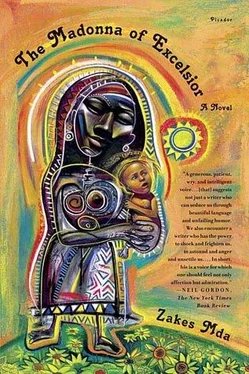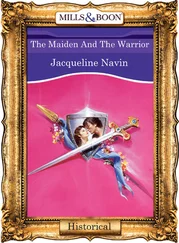Popi had caught a minibus taxi to Tweespruit, twenty-nine kilometres from Excelsior, on the pretext that she was going to ask the trinity to donate a painting for the library in Mahlatswetsa Location. But as she bathed herself in the light of the canvases, she knew that that was not the reason she had come. She did not even mention the donation. She just walked from one canvas to the next. Over and over again. The trinity watched her silently for a while, and then went back to his charcoal drawings.
The works exuded an energy that enveloped her, draining her of all negative feelings. She felt weak at the knees. Tears ran down her cheeks. She did not know why she was crying. She had to go. She walked out of the living room, and out of the mission station, without even saying goodbye. She had not uttered a word to the trinity throughout her visit. Yet she felt she had been healed of a deadly ailment she could not really describe.
In the taxi back home, weakness was replaced by a great feeling of exhilaration. There was no room for anger and bitterness in her any more. Yet an emptiness remained in what she imagined to be her heart. Anger had dissipated and left a void.
How was she to fill the void?
ALL THINGS ARE bright and beautiful. Even the smile on the man straddling the light brown donkey. In the summer heat he wears a blue and white woollen cap, blue overalls and brown boots. He holds a giant white candle to illuminate his path in the bright daylight. The donkey is burdened not only by the man, but also by its huge head and tall ears. And the white brush strokes on its behind. It walks tiredly on the blue and yellow ground. A giant sunflower follows it. Strokes of white clouds rise in the cobalt blue sky. Like smoke signals to a world beyond.
Even bright beautiful days come to an end. The yellow sandstone hills of the Free State changed into dark mounds that loomed on the horizon. Fires began to burn outside some homesteads. Children sang songs of the evening. Boys and girls played hide-and-seek. Finding hiding places where they could tickle one another without being discovered. Smoke from coal stoves and braziers hovered above Mahlatswetsa Location. Over the years, some of us had gradually moved from cow-dung to coal.
The Pule Siblings sat at a brazier in front of their mother’s shack. Viliki sat on an empty beer box and Popi sat on a pile of bricks. They were waiting for the coal to change from black to red-hot before taking the brazier into the shack. By which time the smoke that was billowing to the sky would be gone. Only the fumes would remain. None of them liked to breathe in the fumes from burning coal. They were used to the gentle smoke of dry cow-dung. But Niki’s homestead no longer had sufficient supplies of cow-dung, now that she spent most of her time with the bees instead of gathering cow-dung. And, of course, Popi was busy with her library and council meetings. She had no choice but to buy coal from Sekatle’s coal-yard and carry it home in a battered washing basin.
The Pule Siblings sat as they used to sit when they were a little boy and a little girl. They roasted dry maize on the cob on the side of the brazier where a big hole displayed the coal that was beginning to turn red. Once one side of the cob was roasted, Viliki took it from the brazier and with his thumb plucked out a row of corn, which he crunched with relish. He passed the cob to Popi, who did the same. Then she put it back on the brazier to roast another side.
They sang songs that they used to sing during the struggle. The chimurenga songs of the Zimbabwean war of liberation that Viliki had taught Popi whenever he came back home from the underground. The songs of the Frelimo cadres of Mozambique. They did not understand the languages of these songs. It was possible that they were not even pronouncing the words correctly. But it did not matter. The haunting harmonies were good enough to evoke a feeling of deep nostalgia. As did the songs whose languages they understood very well. The songs that the cadres of the Movement sang, that Viliki had also brought home for Popi’s pleasure. They sang these with a new passion. The passion of those who had fought battles and won, but had not survived the victory.
A profound nostalgia for the romantic days of the struggle attacked them. Days of sacrifice and death. Days of selfless service and hope.
“At least those days we were together fighting the same war as comrades in arms,” reminisced Viliki. “Sharing our suffering and moments of respite. Now others are up there and have forgotten about the rest. Survival of the fittest is the new ethos. Each one for himself or herself in the scramble for the accumulation of wealth.”
It had started like that in Zimbabwe too — a liberation struggle that had inspired Viliki and his comrades during the worst moments of their own oppression. As soon as the revolutionaries had got into power, Popi wailed, they had focused on accumulating farms and hotels for themselves. Ardent revolutionaries continued to use the rhetoric of socialism, while in behaviour and outlook they were born-again capitalists.
“Of course we live in a capitalist world. What do you expect them to do?” asked Viliki, who had sharp differences with his sister on the question of capitalism versus socialism, thanks to the library books she was no longer just caressing but reading as well. The same books that had exposed her to the world of the Flemish expressionists had also taken her to Cold War era debates on political and economic systems of the world. With the basic knowledge she had gleaned from these pages, she decided that socialism made more sense to her, while Viliki, ever the loyal and disciplined cadre of the Movement that had kicked him out, followed the national leaders to capitalism.
“I expect them to be honest,” said Popi. “They must not pretend that they are socialists. And they must not accumulate capital by looting the coffers of the state and by taking kickbacks from contractors.”
Viliki agreed that the Zimbabwean leaders had failed their people, and that to entrench themselves in power, they were now rendering their own country bankrupt and ungovernable. They were trampling on the human rights of their own people.
The Pule Siblings consoled themselves that at least in South Africa, democracy remained intact. The human rights culture was being entrenched every day. But Viliki expressed fear for the future. For how long would the Mandela legacy of tolerance last? Already he could see signs of the arrogance of power gradually turning into racial arrogance — even within the Movement, which had prided itself on being a non-racial party. This could be seen every day in Mahlatswetsa among the leadership of the Movement, who strutted around pretending that their blackness elevated them to the ranks of angels, while the fact that they were once oppressed made them into very special people who could never be criticised. Critics, however constructive they might be, were being labelled racists or lackeys of racists. It had become treacherous for a black person to point out the corruption of a fellow black.
People like Sekatle were turning into black Tjaart Cronjes. In Sekatle’s campaign for the local elections that were coming in a few months’ time, he never forgot to mention that the Pule Siblings had sold out to the whites. That Excelsior was cursed with a white mayor almost six years after liberation because of their vote. The perceived friendship between the Pule Siblings and the de Vries family was frowned upon, not because of the de Vries’ history and political pedigree, but because they were white. After all, Sekatle himself had a dubious history.
Niki sat on the bed in her shack and listened to her children moan about how things had turned out for them. She was happy that they had failed to take her children away. The nestlings — for they would remain nestlings for as long as she lived — had returned to the nest. She was happy that even though Viliki had his two RDP houses, and had the Seller of Songs, he still found time to visit the old shack, to sit around the fire with his sister, and to sing songs and tell stories.
Читать дальше












